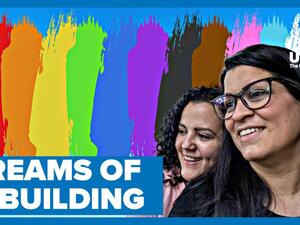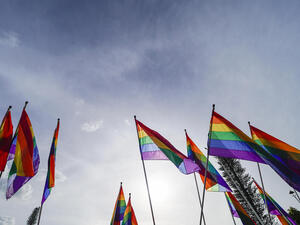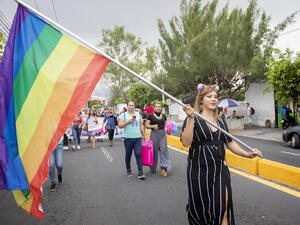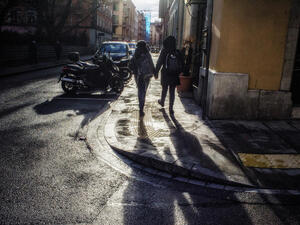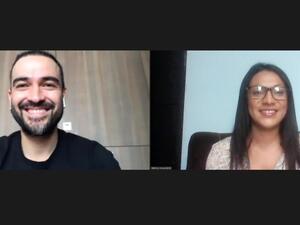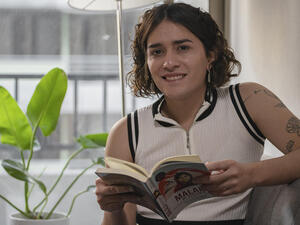More concerted action needed to better protect LGBTIQ+ people forced from home
More concerted action needed to better protect LGBTIQ+ people forced from home

Hanging an LGBTIQ+ flag in Mexico.
A landmark international conference opened today to address the urgent need to better protect lesbian, gay, bisexual, transgender, intersex, and queer (LGBTIQ+) people around the world who have fled violence or persecution and are seeking refuge inside their own countries or across borders.
On the first day of the 2021 Global Roundtable on Protection and Solutions for LGBTIQ+ People in Forced Displacement, participants from government, civil society and the private sector began discussions on the challenges – and potential solutions – for LGBTIQ+ people who have been forced to flee.
“LGBTIQ+ people around the world face violence and discrimination from their governments, their communities and even from their own families,” said Gillian Triggs, Assistant High Commissioner for Protection for UNHCR, the UN Refugee Agency. “I hope that this Roundtable will energize the international community to inspire more genuine protection for LGBTIQ+ people on the move.”
The conference was convened by Filippo Grandi, the UN High Commissioner for Refugees, and co-hosted by Gillian Triggs and Victor Madrigal-Borloz, who serves as the UN Independent Expert on Protection Against Violence and Discrimination Based on Sexual Orientation and Gender Identity (UN IE SOGI). It is the first UN-sponsored meeting on the subject since 2010.
The Roundtable will take place from 7-29 June, during which some 600 participants will explore the forces driving displacement, the challenges facing those seeking asylum, the push for inclusion in national services and the effects of the COVID-19 pandemic on LGBTIQ+ people. They will also share information on policies and programmes that have proven effective and make specific recommendations to governments, UN agencies, NGOs private sector actors and others on the actions needed to address the many risks faced by displaced people with an LGBTIQ+ profile.
“The work of addressing violence and discrimination based on sexual orientation and gender identity necessarily includes an intersectional perspective, within which refugees and asylum seekers are a population of fundamental concern for my mandate,” said Madrigal-Borloz. “This comprehensive and participative process will lead to the creation of a shared knowledge base from which stakeholders will be able to derive their strategic thinking.”
Currently, 69 countries criminalize same sex relationships and at least five nations have made them punishable by death. Other countries have enacted legislation that directly discriminates against LGBTIQ+ people or vaguely written laws that authorities use to persecute LGBTIQ+ people.
“LGBTIQ+ people around the world keep dying and moving around to flee for their lives – this Roundtable is the right platform for us to say something,” said Suma Abdelsamie, Egyptian trans refugee and activist living in Berlin. “Many of us have been silenced for years. I have lived my own war, fighting alone and now we have to do something to make things better for LGBTIQ+ refugees.”
Forcibly displaced people who are LGBTIQ+, regardless of whether they fled specifically because of their gender identity, sexual orientation or sex characteristics, face a high risk of sexual abuse and violence, in many contexts receive little or no police protection and often face discrimination and other obstacles in trying to access basic services, such as health care and legal aid both on their journey and once they arrive at a destination.
The recommendations of the LGBTIQ+ Roundtable will be shared in a joint press conference on 30 June with Victor Madrigal-Borloz, the IE SOGI and Gillian Triggs, UNHCR Assistant High Commissioner for Protection.
For more information, please contact:
UNHCR
- In New York, Kathryn Mahoney, [email protected], +1 347 443 7646
OHCHR:
- Catherine de Preux De Baets, [email protected], +41 22 917 93 27


